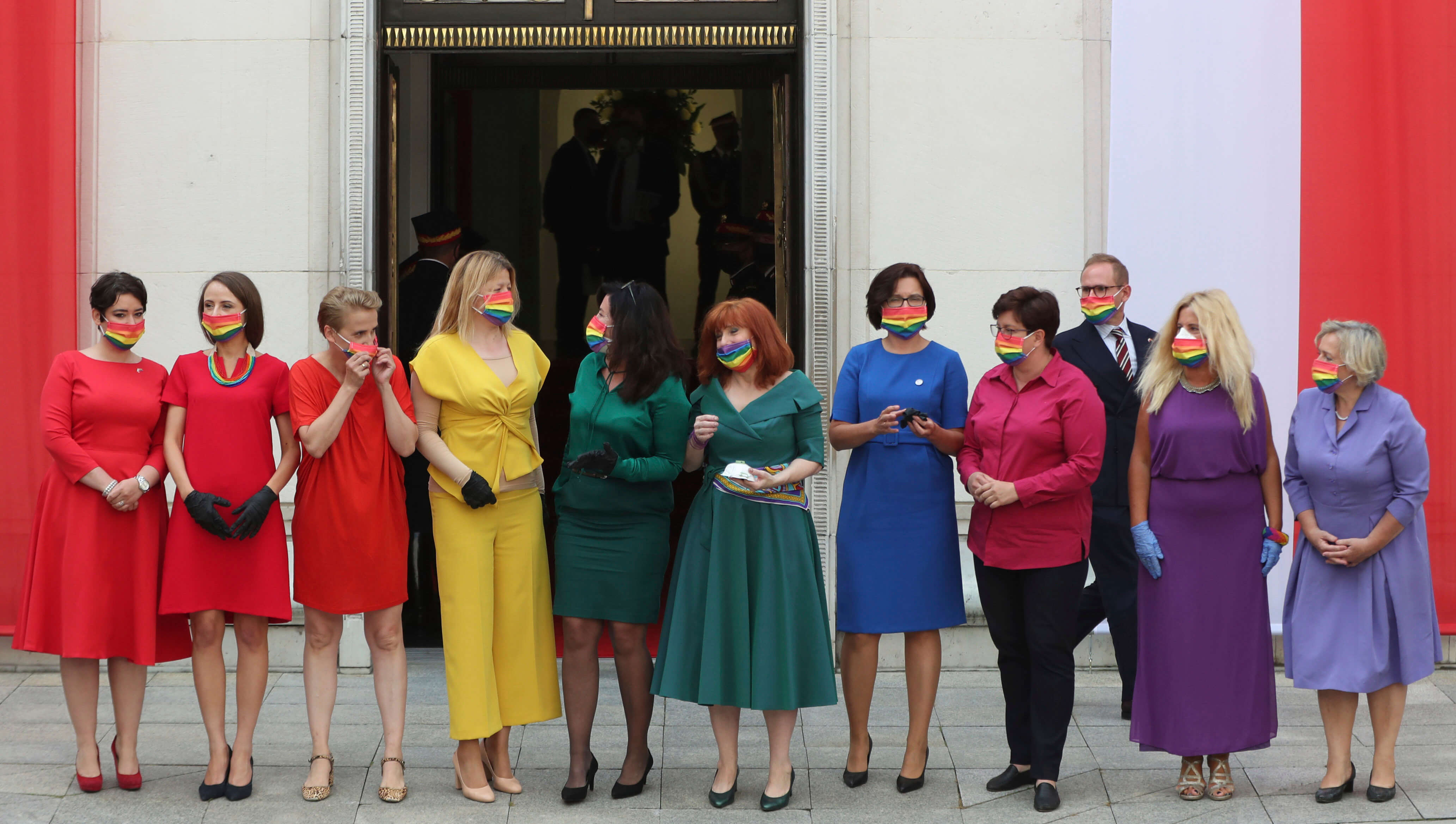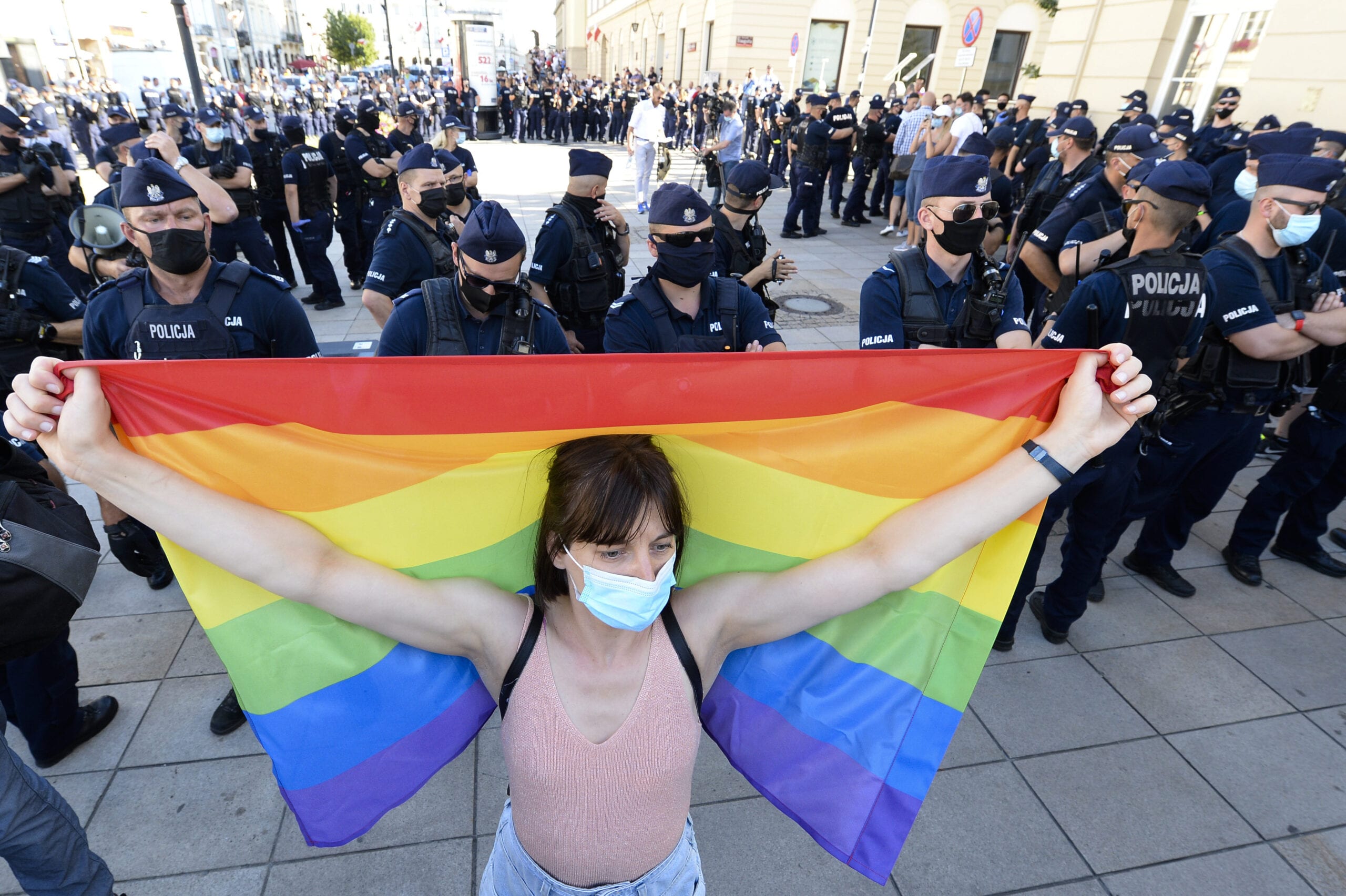The rainbow flags were erected under cover of darkness—but the symbolism couldn’t have been clearer. Copernicus held one; so too did the Warsaw mermaid, bearing it alongside her sword. One was draped next to Polish national hero Józef Pisudski. One was sello-taped to the arm of Christ.
Organized by three LGBTQ groups—Stop Bzdurom (Stop Bullshit), Gang Samzamt and Poetka—who targeted prominent statues across the Polish capital of Warsaw, the action on that balmy late July night was designed as a protest against the country’s now-infamous stance on LGBTQ rights.
Rainbow symbols were always going to cause provocation in conservative Poland, where hostility toward LGBTQ people has become commonplace. Earlier this year, Poland was ranked by advocacy group ILGA Europe as the worst country in the European Union for LGBTQ rights, particularly noting the church and government’s hateful rhetoric toward queer and trans people. Last year, the Archbishop of Kraków, Marek Jdraszewski, said Poland was threatened by an “LGBT ideology,” which he also referred to as a “rainbow plague.” And during the presidential election this summer, President Andrzej Duda—an ally of the ruling right-wing national conservative party, Law and Justice—included homophobic pledges in what became his successful re-election bid. He also called LGBTQ rights an “ideology”—beliefs he claimed are worse than Communism.
This has left the LGBTQ community in Poland under attack, giving activist groups the ammunition they need to fight back—covert rainbow flag missions and all.
“We’ve been called a plague that needs to be eradicated, pedophiles who want to molest school kids, a moral and mental disease that needs to be mitigated and worse,” says Hubert Sobecki, from the organization Mio Nie Wyklucza (Love Does Not Exclude). “As a result we have violence. A lot of it.”
Sobecki fears Poland could be going the way of Russia, where anti-LGBTQ hate crimes are encouraged by the state. And hostility is growing among the public, too—Sobecki says the situation for Poland’s LGBTQ community is “getting worse every day.”
Sobecki adds that in just one day, on August 18, there were four separate incidents of homophobic and transphobic violence. “People are getting harassed and beaten up for carrying a rainbow flag on their backpack or putting a trans flag in their flat window. Two boys were beaten up right in front of their house here in Warsaw for simply holding hands,” he says.
Over the last year, as many as 97 towns in Poland declared themselves “free from LGBT ideology,” adopting family rights charters that discriminate against the LGBTQ community. In February, an Atlas of Hate map was created, showing that the towns make up an area spanning one-third of Poland—larger than the size of Hungary.
One of the map’s creators, LGBTQ activist Kuba Gawron, also says that Poland’s LGBTQ community faces a worrying future. “A future awaits us in which politicians, the church, pro-government media and associations incite violence against the LGBTQ community, and the state responds to attempts to defend against them by abusing the penal and civil code,” he explains. “Already, such state homophobia results in an increase in cases of verbal and physical violence, depression, suicidal thoughts.”
The July flag protest, which left statues across the Polish capital festooned with rainbows, was an attempt to invoke change. In their manifesto, Stop Bzdurom wrote that it was their “call to fight,” and they promised “to provoke” for as long as rainbow flags were considered “inappropriate.”
“The protest, which left statues across the Polish capital festooned with rainbows, was an attempt to invoke change”
The protest led to three activists’ arrests, who were accused of insulting monuments and offending religious feelings. Polish Prime Minister Mateusz Morawiecki called it “an act of vandalism.”
But a week later, on August 7, Stop Bzdurom’s call to fight was answered. One of the activists involved in the flag action, Margot, was given a two-month temporary arrest on a separate charge for allegedly damaging an anti-abortion campaigner’s van back in June. Dozens of protesters came out to support her. Many arrived at Warsaw’s historical Krakowskie Przedmiecie street to block the police car taking her to the station, while others shouted at the police. In the clashes that followed, 48 people were arrested.
The next day, a report by the Polish Ombudsman’s office—based on interviews with 33 of the detainees—revealed evidence of police brutality, homophobia and transphobia. It also said that some of the arrested people did not actively take part in the protests and were merely close by.
Nineteen-year-old Aleksander Wentykier was one of them. Visiting family in Warsaw, he decided to go to the location of the protest, which had already ended by the time he arrived in the city. As he stopped by the Copernicus monument, a police officer grabbed him and shoved him into a police car without explaining why he was being detained.
“A rainbow is enough to get arrested in Poland now”
Wentykier thinks he was arrested because he was wearing a rainbow mask. “I didn’t realize it at the time of my arrest, but they arrested a lot of people that didn’t take part in the protest itself, they just happened to be nearby and in some cases had something rainbow like me,” he explains. “A rainbow is enough to get arrested in Poland now.”
Wentykier, who is a trans man, says that during his arrest he was searched by a female police officer. He was also told he could not use the bathroom until the policewoman arrived. It was past midnight when he was informed he would have to spend the night in a police cell where, he says, he was left without a drink, prohibited from taking his medication and unable to notify his parents until the early hours of the morning. He was ultimately kept in custody for 22 hours.
“I’m still coming to terms with what happened,” he says. “But the most terrifying thing that I realized is that I’m not afraid of attacks from random people who wouldn’t like the fact that I have a rainbow mask, like I have before. I’m afraid of the police, because how can I know that if I ever want to report a crime they won’t say that the real crime was me walking with a rainbow accessory?”
The tumultuous events of August 7 have since sparked further protests across Poland. Bartosz Staszewski, another LGBTQ activist, says he thinks they are “creating momentum” for real change in Poland. “There is something ongoing now—maybe after some time we will understand that it was a turning point,” he says.

Poland's left-wing lawmakers dressed in rainbow colours to show support for the LGBTQ community outside the parliament building ahead of the swearing in ceremony of President Andrzej Duda for a second term. Credit: AP Photo/Czarek Sokolowski
Sobecki agrees. “From the perspective of our movement it was a formative moment—a test of blood and tears,” he says. “For the first time, we were not only verbally targeted and legally discriminated against but physically abused by the state and people who are supposed to protect us. There is a lot of fear but also anger and courage, which fuel a new generation of activists.”
Sobecki says he’s seen an uptick in allies supporting LGBTQ rights in Poland. And solidarity is becoming more visible, too: As Andrzej Duda was sworn in as president, a group of Polish left-wing female MPs coordinated the colours of their outfits to form a rainbow and donned rainbow masks outside parliament in what became a viral moment seen around the world.
Protests have also gone international, with solidarity marches from London to Budapest to Berlin. In a statement, Bjorn van Roozendaal, Programmes Director of ILGA-Europe, says that “the European Commission must take a strong stand in defending fundamental rights and the rule of law in Poland, including the rights of LGBTI people.”
“International support and a growing sense of urgency in the EU are definitely much, much needed,” Sobecki adds, calling on global activists to stay informed, and persuade local governments to put pressure on Poland. “We can’t do this alone.”
With recent events now being dubbed the “Polish Stonewall,” activists hope that real change in Poland—supported by international activism—will come soon.
“If everybody says it’s the Polish Stonewall, it is the Polish Stonewall,” Staszewski concludes triumphantly.


 Why you can trust Xtra
Why you can trust Xtra


